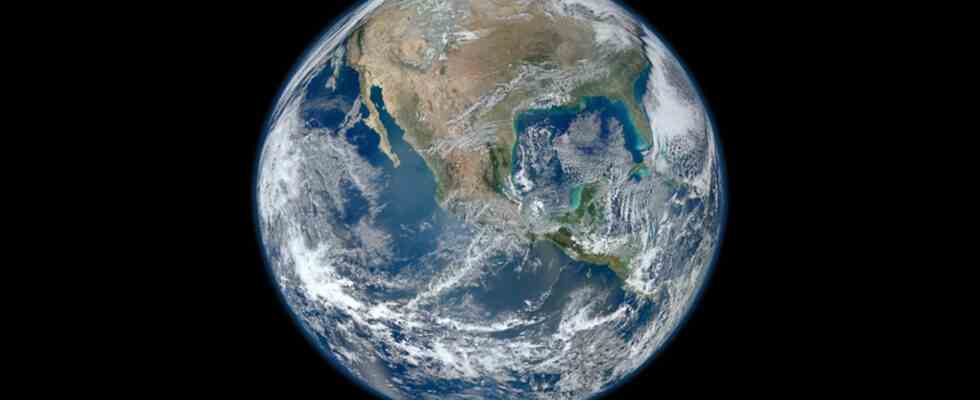Status: 15.11.2022 5:08 a.m
More and more people do not want to wait and want to make their own contribution to protecting the climate. According to research by ARD political magazine report Mainz many Germans are willing to change their lives for more climate protection.
In the eco-village of Sieben Linden in Saxony-Anhalt, residents have been eating vegan for many years. Vegetables and fruit that they grow on their own fields are the main food on the table. They cook together, share many everyday things and, above all, use public transport. The residents want to consciously live sustainably and refrain from consumption in order to protect the climate. The special construction of their houses made of wood, straw and clay also saves resources and CO2. In the spirit of “degrowth” – the English word describes the restriction of consumption for the benefit of nature and climate protection.
Growth main reason for climate crisis?
The political think tank “concept work new economy” in Leipzig is convinced that the pursuit of more and more economic growth is a main reason for the climate crisis. That is why they are calling for a move away from the need to grow. “If we assume that infinite growth is not possible on a planet with limited resources, and if we try, as is currently happening, we see crises such as the climate crisis,” Ruth Krohn explains the political approach of the Group.
But how many Germans are willing to really change their lifestyle for the sake of the climate? To find out, has Report Mainz commissioned a representative survey from the opinion research institute infratest dimap. In the past week, 1225 people nationwide were interviewed. In the survey, around half of all Germans are willing to change their lifestyle to protect the climate. And even turning away from the paradigm of economic growth is conceivable for many.
renunciation of economic growth
Buying fewer new things, repairing and sharing more and forgoing ever more economic growth in order to protect the climate: how do Germans feel about this basic idea of the degrowth movement? The survey shows: 46 percent of those surveyed agree with the statement that “we must forego economic growth in order to stop climate change”. Just as many, also 46 percent, reject this thesis.
The majority can imagine driving less
For many, doing without their own car is also conceivable. When asked, “In view of climate change, are you willing to drive your own car less often or not at all?”, 19 percent of those surveyed stated that they hardly ever use a car. Another 35 percent can imagine doing without it more often. For 44 percent, however, this is out of the question. They tend not to (24 percent) or not at all (20 percent) want to restrict their individual mobility.
Abandoning meat is conceivable for many
When asked: “In view of climate change, are you prepared to eat less meat or not to eat it at all?”, 49 percent said they were prepared to eat less meat or not to eat it at all in order to protect the climate. Eight percent state that they are already vegetarian or vegan. The higher educated and women in particular can imagine changing their diet to protect the climate. On the other hand, there are 41 percent who would rather not or “definitely not” want to do without meat.
Production and consumption of food climate-neutral by 2100?
Using computer simulation models, researchers at the Potsdam Institute for Climate Impact Research have calculated which measures would have to be taken to significantly reduce CO2 emissions in the food sector. A mere waiver of economic growth, as demanded by the degrowth movement, leads to a slight reduction in greenhouse gases, but is not sufficient. Only by combining several measures can the production and consumption of food be made emission-neutral by the end of this century.
Hermann Lotze-Campen explains this in an interview Report Mainz: “The three most important measures to reduce food-related emissions are actually switching to a very plant-based diet. Reduction of waste, i.e. throwing away as little food as possible. And then production must be designed with as few emissions as possible.” In order to achieve that, there must be a clear price tag for emissions in agriculture. “Basically, animal products have to be made more expensive and plant products cheaper,” says Lotze-Campen.
CO2 tax on food
Are the Germans willing to accept higher prices for climate protection? 42 percent agree with the statement “the ecological costs for products, goods and services should be included more in the price, to play in the form of a CO2 tax”. More than half (51 percent) disagree with this statement.
Report Mainz asked the Federal Ministry of Economics for an opinion on the demand for CO2 pricing of food. The ministry did not reply.
Saving the climate by refraining from consumption
Thomas Nettelmann, SWR, 15.11.2022 5:08 a.m

